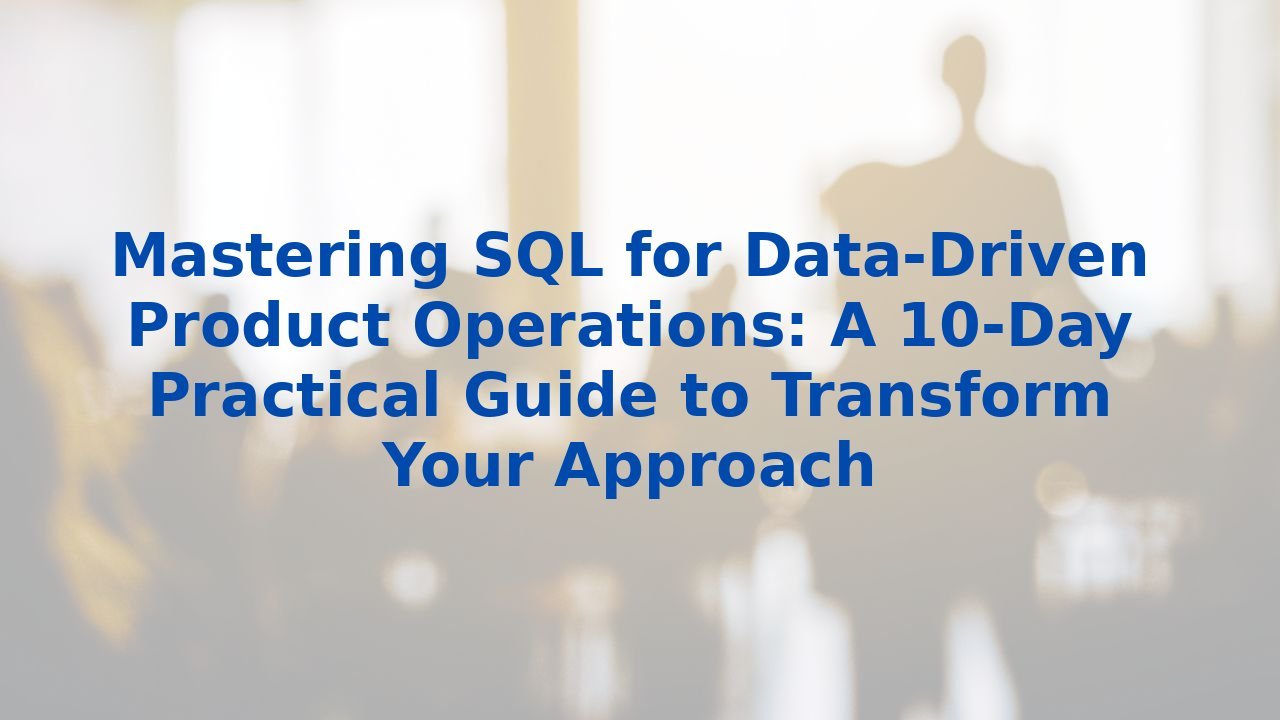Mastering SQL for Data-Driven Product Operations: A 10-Day Practical Guide to Transform Your Approach
Mastering SQL for Data-Driven Product Operations: A 10-Day Practical Guide to Transform Your Approach
In an era where data dictates the competitive edge of organizations, mastering SQL (Structured Query Language) for effective data management is not just advantageous—it's imperative. Over a structured ten-day journey, professionals can transcend basic aptitude in SQL to become adept in using this powerful tool, thereby transforming product operations and driving strategic decisions with data-driven insights.
Understanding the Power of SQL in Product Operations
SQL is the backbone of relational database management systems, essential for querying, inserting, updating, and deleting data from databases. For product operations, SQL serves as the gateway to unlocking insights hidden in vast datasets. Whether it’s analyzing user behavior, optimizing inventory levels, or forecasting demand, SQL facilitates data manipulation that empowers teams to make informed decisions.
The Intersection of AI and SQL
Artificial Intelligence (AI) amplifies the capabilities of SQL by automating data analysis and providing predictive insights that were once time-consuming to uncover. AI tools can rapidly assess historical queries and patterns, enabling businesses to project future trends and inform product strategies. Imagine being able to predict customer preferences based on data analyzed at lightning speed—this is the promise of integrating AI with SQL.
Ten-Day Practical Guide to Master SQL
Embarking on your SQL journey can be organized effectively over ten days. Here’s a breakdown of what that might look like:
Day 1-2: Fundamentals of SQL
- Learn basic syntax, data types, and commands
- Experiment with SELECT, INSERT, UPDATE, and DELETE statements
Day 3-4: Database Design & Normalization
- Understand database structures and the importance of normalization
- Create your first tables and relationships between them
Day 5-6: Advanced Queries
- Dive into JOIN operations (INNER, LEFT, RIGHT) and aggregate functions
- Practice grouping, filtering, and ordering data efficiently
Day 7: Utilizing Functions and Procedures
- Learn how to create and use functions, stored procedures, and triggers
- Explore real-world applications in product operations
Day 8: Data Security and Performance Optimization
- Discover best practices for securing data access and improving query performance
- Assess how data integrity measures apply in your operational context
Day 9: Integrating AI with SQL
- Explore how AI algorithms can work alongside SQL for predictive insights
- Leverage AI for real-time data analysis and decision-making
Day 10: Implementation and Review
- Identify a project within your organization to apply what you’ve learned
- Gather feedback and iterate on your work
The Future: Training Employees for AI Integration
As organizations evolve, training employees to work with both SQL and AI becomes essential. This dual capability not only cultivates a robust skill set but also enhances overall productivity. Employees trained in these technologies can:
- Leverage advanced data analytics, enabling better understanding and utilization of market trends.
- Streamline operations by automating routine data tasks, thus focusing on strategic initiatives that drive innovation.
Moreover, continuous learning nurtured through structured training programs leads to a culture of adaptability. Organizations that emphasize skill development in AI and SQL will not only create a competitive advantage but will also prepare their workforce for the challenges of a rapidly changing digital landscape.
Conclusion
Mastering SQL for data-driven product operations is a journey that, when combined with AI capabilities, promises unparalleled opportunities for efficiency and growth. With a well-structured plan and the commitment to learning, professionals can transform their approach to product operations, ensuring they are equipped to navigate the complexities of the market. Embrace this path, invest in training, and watch as your organization thrives in a data-dominated world.
For your organization to fully capitalize on AI training and certification, consider exploring comprehensive resources available that focus on equipping your entire workforce with the skills necessary for future success.



